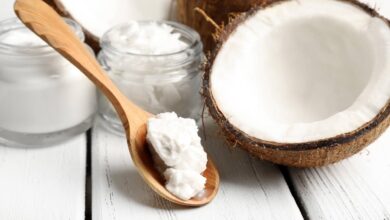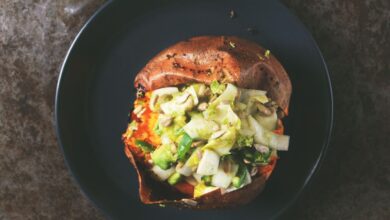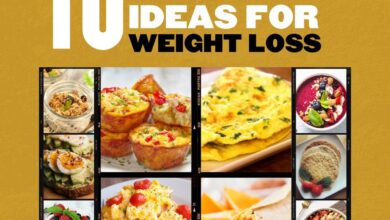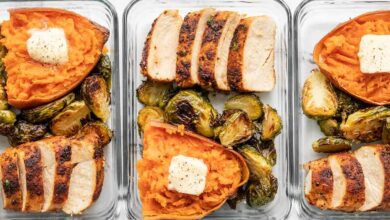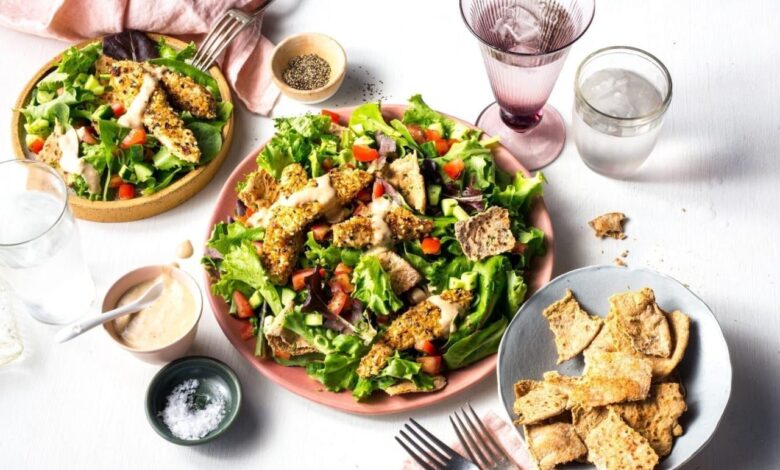
7 Low Sodium Lunches Under 400 Calories: Delicious & Healthy
7 Low Sodium Lunches Under 400 Calories: Imagine a lunch that’s both delicious and healthy, helping you manage your sodium intake without sacrificing flavor. That’s what we’re diving into today! Whether you’re trying to lower your blood pressure, manage your weight, or simply enjoy a healthier lifestyle, these easy-to-follow recipes are perfect for anyone looking for tasty and nutritious meal options.
Get ready to explore a world of fresh flavors and satisfying meals, all while keeping your sodium levels in check.
These recipes are packed with nutritious ingredients like lean protein, whole grains, and fresh vegetables. Each recipe is under 400 calories and has been carefully crafted to be low in sodium, ensuring you can enjoy your meals without worrying about exceeding your daily limits.
We’ll also share some valuable tips for reducing sodium intake, substituting high-sodium ingredients, and finding healthy flavor enhancers. Ready to transform your lunch routine? Let’s get started!
Lunchtime Low Sodium: 7 Delicious & Healthy Meals Under 400 Calories
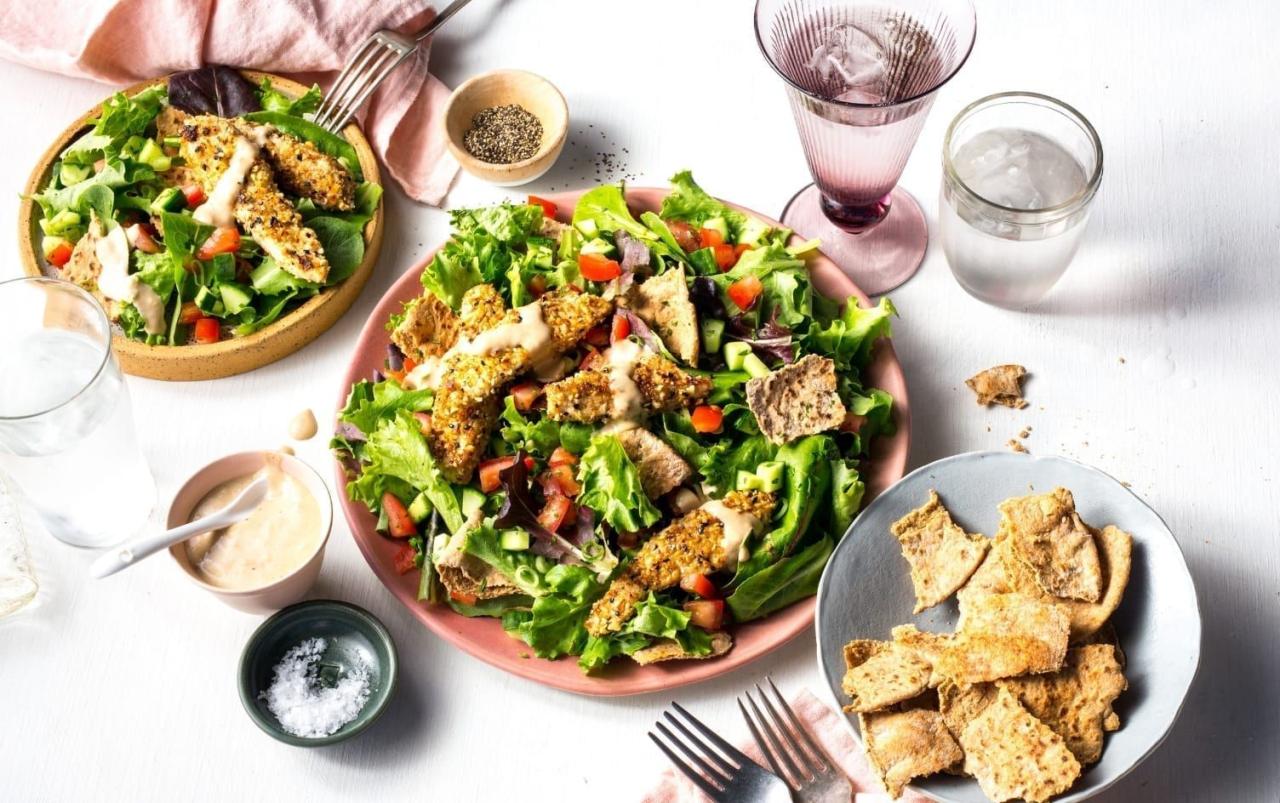
Navigating the world of healthy eating can feel overwhelming, especially when it comes to lunch. Balancing delicious flavors with dietary restrictions can be a challenge, but it doesn’t have to be! This guide provides a roadmap to 7 low-sodium lunches, each clocking in under 400 calories.
These meals are perfect for those seeking to manage their sodium intake while still enjoying flavorful and satisfying lunches. Whether you’re aiming to lower your blood pressure, manage a health condition, or simply want to adopt a healthier lifestyle, these recipes are a great place to start.
Benefits of Low-Sodium Diets
Following a low-sodium diet offers a range of health benefits. Reducing sodium intake can contribute to:
- Lower Blood Pressure:High sodium intake is a major contributor to high blood pressure, which can increase the risk of heart disease and stroke. A low-sodium diet helps manage blood pressure levels, reducing the risk of these serious health conditions.
- Improved Heart Health:A low-sodium diet plays a crucial role in maintaining heart health. By reducing sodium intake, you can lower blood pressure, decrease the strain on your heart, and reduce the risk of heart disease.
- Weight Management:Processed foods, which are often high in sodium, are also typically high in calories and unhealthy fats. Switching to low-sodium meals can contribute to a healthier diet overall, potentially aiding in weight management.
- Reduced Risk of Kidney Disease:High sodium intake can put a strain on your kidneys, increasing the risk of kidney disease. A low-sodium diet can help protect your kidneys and reduce this risk.
7 Low-Sodium Lunch Recipes Under 400 Calories
Lunchtime is often a rush, but it doesn’t have to be a nutritional compromise. These seven low-sodium lunch recipes, each under 400 calories, are quick, easy, and packed with flavor and nutrients. Whether you’re looking for a light and refreshing salad or a hearty and satisfying bowl, these recipes will help you fuel your afternoon without compromising your health goals.
7 Low-Sodium Lunch Recipes Under 400 Calories
These recipes are designed to be flavorful, nutritious, and easy to prepare. Each recipe provides detailed ingredient lists and step-by-step instructions to make meal prepping a breeze.
| Recipe Name | Ingredients | Instructions | Nutritional Information (per serving) |
|---|---|---|---|
| Mediterranean Quinoa Salad |
|
|
|
| Chicken and Black Bean Salad |
|
|
|
| Tuna Avocado Salad |
|
|
|
| Lentil Soup |
|
|
|
| Turkey and Veggie Wrap |
|
|
|
| Salmon and Sweet Potato Bowl |
|
|
|
| Greek Yogurt with Berries and Granola |
|
|
|
Tips for Creating Low-Sodium Lunches
It’s easy to get caught up in the deliciousness of savory flavors without realizing the amount of sodium you’re consuming. Reducing sodium intake is important for maintaining good health and managing blood pressure. This doesn’t mean sacrificing flavor, though! By making smart choices and incorporating a few simple tips, you can create low-sodium lunches that are both delicious and healthy.
Substituting High-Sodium Ingredients
Reducing sodium in your meals starts with understanding the sources. Many processed foods are loaded with sodium, making it essential to make conscious choices. Here’s how you can substitute high-sodium ingredients with healthier alternatives:
- Canned Goods:Opt for low-sodium or no-salt-added versions of canned vegetables, beans, and soups. Rinse canned foods with water to remove excess sodium.
- Processed Meats:Limit processed meats like bacon, sausage, and deli meats, which are high in sodium. Instead, choose lean protein sources like grilled chicken, fish, or tofu.
- Sauces and Condiments:Be mindful of the sodium content in sauces, dressings, and condiments. Choose low-sodium or homemade versions whenever possible.
- Bread:Look for whole-grain breads with lower sodium content.
Low-Sodium Seasonings and Flavor Enhancers
Don’t let the absence of salt diminish the taste of your meals! There are many delicious and healthy ways to enhance flavors without adding excessive sodium.
- Herbs and Spices:Experiment with fresh or dried herbs like basil, oregano, thyme, rosemary, and cilantro. Spices like garlic powder, onion powder, paprika, cumin, and turmeric add depth and complexity to your dishes.
- Citrus Juices:Lemon, lime, and orange juices are natural flavor enhancers and can brighten up your meals.
- Vinegar:A splash of vinegar, such as apple cider vinegar or balsamic vinegar, can add tanginess and depth of flavor.
- Hot Sauce:Use a few drops of hot sauce to add a kick and spice up your dishes.
Grocery Shopping for Low-Sodium Lunches
Navigating the grocery store can be overwhelming, especially when trying to stick to a low-sodium diet. This section will guide you through the essential ingredients and provide tips for making informed choices.
Essential Low-Sodium Ingredients
It’s important to have a well-stocked pantry with low-sodium staples. This will make meal preparation easier and ensure you have the ingredients for healthy, delicious lunches.
- Fresh Produce:Fruits and vegetables are naturally low in sodium. Opt for a variety of colors and textures to add flavor and nutrients to your meals.
- Lean Protein:Chicken breast, fish, beans, lentils, tofu, and eggs are excellent sources of protein. Choose lean cuts of meat and avoid processed meats, which are often high in sodium.
- Whole Grains:Brown rice, quinoa, and whole-wheat bread are healthier options than refined grains. These provide fiber and complex carbohydrates, which help you feel full and satisfied.
- Healthy Fats:Olive oil, avocado, and nuts are good sources of healthy fats. These can add flavor and help with nutrient absorption.
- Low-Sodium Broth:Use low-sodium broth for cooking and flavoring your meals. You can also make your own broth at home using fresh vegetables and herbs.
- Spices and Herbs:Spices and herbs are a great way to add flavor to your meals without adding sodium. Experiment with different combinations to find your favorites.
Grocery Stores and Online Platforms
Several grocery stores and online platforms offer low-sodium options.
Finding healthy and delicious lunches under 400 calories can be a challenge, especially when you’re trying to keep sodium levels in check. One way to make your meals more satisfying and nutritious is to load up on veggies! Check out this article on 5 ways to up your vegetable game for some great tips.
You’ll be surprised at how much flavor and volume you can add to your 7 low sodium lunches under 400 calories with just a few simple swaps!
- Traditional Grocery Stores:Most major grocery stores have dedicated sections for low-sodium products. Look for labels like “low sodium,” “no salt added,” or “sodium-free.” Some stores also offer pre-packaged low-sodium meals and snacks.
- Health Food Stores:Health food stores often carry a wider selection of low-sodium products, including organic and natural options.
- Online Grocery Delivery Services:Many online grocery delivery services allow you to filter products by sodium content, making it easier to find low-sodium options.
Tips for Navigating the Grocery Store
- Read Food Labels Carefully:Pay attention to the sodium content listed on food labels. Choose products with lower sodium levels, ideally under 140 milligrams per serving.
- Avoid Processed Foods:Processed foods are often high in sodium. Opt for whole, unprocessed foods whenever possible.
- Check the Ingredients List:Look for ingredients like “salt,” “sodium chloride,” and “monosodium glutamate (MSG),” which are all sources of sodium. Choose products with shorter ingredient lists and avoid those with added sodium.
- Choose Fresh Produce:Fresh fruits and vegetables are naturally low in sodium and provide essential nutrients. Choose a variety of colors and textures to add flavor and variety to your meals.
- Prepare Meals at Home:Cooking at home allows you to control the sodium content of your meals. Use low-sodium ingredients and spices to create flavorful and healthy dishes.
Meal Prep Strategies for Low-Sodium Lunches
Meal prepping is a game-changer for anyone aiming for a healthier lifestyle, especially when it comes to managing sodium intake. It allows you to control ingredients, portion sizes, and cooking methods, ensuring your lunches are both delicious and low in sodium.
Benefits of Meal Prepping for a Healthy Lifestyle
Meal prepping offers numerous benefits for a healthier lifestyle.
Looking for healthy lunch options that won’t break the calorie bank? I’ve got you covered with 7 low sodium lunches under 400 calories! These meals are packed with flavor and nutrients, making them perfect for anyone trying to maintain a healthy weight.
And remember, small changes can make a big difference. Check out these 10 Simple Changes That Lead to Weight Loss for some extra inspiration. Now, back to those low sodium lunches! You’ll find plenty of satisfying options, from hearty salads to protein-packed wraps, that will keep you energized and on track for your goals.
- Saves Time:Instead of scrambling to prepare lunch every day, you can spend a few hours on the weekend prepping meals for the entire week. This saves valuable time and eliminates the stress of figuring out what to eat each day.
- Promotes Healthy Eating:Meal prepping encourages you to plan ahead and choose nutritious foods, making it easier to avoid unhealthy takeout options. You can ensure your lunches are balanced with lean proteins, whole grains, and plenty of vegetables.
- Helps Control Portions:Pre-portioning your meals can help you control your calorie and sodium intake. This is especially beneficial for managing weight or following a specific dietary plan.
- Saves Money:By preparing meals at home, you can save money compared to buying lunches out every day. You can also reduce food waste by using up ingredients efficiently.
- Increases Convenience:Having pre-made meals readily available can make healthy eating more convenient. You can grab a nutritious lunch and be on your way, eliminating the temptation to grab something quick and unhealthy.
Sample Meal Prep Plan for a Week
Here’s a sample meal prep plan for a week, incorporating low-sodium lunch options:
- Monday:Grilled chicken salad with mixed greens, cherry tomatoes, cucumber, and a low-sodium vinaigrette dressing.
- Tuesday:Lentil soup with whole-wheat bread. Lentils are naturally low in sodium and packed with protein and fiber.
- Wednesday:Quinoa salad with roasted vegetables like bell peppers, zucchini, and onions. Use herbs and spices for flavor instead of salt.
- Thursday:Tuna salad sandwich on whole-wheat bread with mustard and lettuce. Choose tuna packed in water instead of oil to reduce fat and sodium content.
- Friday:Leftovers from dinner. If you’re making a low-sodium dinner, you can easily have leftovers for lunch the next day.
Tips for Efficiently Preparing and Storing Meals
- Choose Recipes that Can Be Made in Bulk:Select recipes that can be doubled or tripled to prepare enough for multiple meals. This saves time and effort.
- Utilize Your Freezer:Freeze portions of your prepped meals to extend their shelf life. This allows you to enjoy fresh meals throughout the week, even if you don’t have time to cook every day.
- Invest in Reusable Containers:Use airtight containers to store your prepped meals. This helps prevent spills and keeps food fresh.
- Label and Date Your Meals:Label your containers with the contents and date to help you stay organized and know which meals are ready to eat.
- Prioritize Flavor Over Salt:Experiment with different herbs, spices, and citrus juices to enhance flavor without adding extra sodium. You can find low-sodium versions of common seasonings at most grocery stores.
Healthy Snacking Options
Maintaining a healthy lifestyle often involves making mindful choices about what we eat, even when it comes to snacks. When following a low-sodium diet, snacking can be a challenge, but it doesn’t have to be. There are plenty of delicious and nutritious options that can satisfy your cravings without jeopardizing your health goals.
Low-Sodium and Low-Calorie Snack Options
Here are some low-sodium and low-calorie snack ideas that complement the lunch recipes we’ve discussed. These snacks are designed to keep you feeling full and energized between meals, while also contributing to your overall health and well-being.
I’m all about keeping things light and healthy, especially when it comes to lunch. That’s why I’ve been loving these 7 low sodium lunches under 400 calories! They’re perfect for keeping my energy levels up without weighing me down. And speaking of keeping things light, you might also enjoy checking out 11 healthy pizzas under 400 calories for a guilt-free treat.
I’m always looking for ways to make healthy choices, and these pizzas are definitely a win! Back to my low sodium lunches, I find that they’re especially helpful for those days when I’m trying to be mindful of my sodium intake.
| Snack Name | Nutritional Information |
|---|---|
| 1/2 cup plain Greek yogurt with 1/4 cup berries | Provides protein, calcium, and antioxidants, with minimal sodium and calories. |
| 1 medium apple with 2 tablespoons of almond butter | Offers fiber, healthy fats, and a satisfying crunch, with a low sodium content. |
| 1 cup air-popped popcorn with a sprinkle of nutritional yeast | A whole-grain snack that’s high in fiber and low in calories, with minimal sodium. |
| 1/4 cup trail mix with unsalted nuts, seeds, and dried fruit | A convenient and nutritious snack, choose low-sodium nuts and seeds for optimal results. |
| 1 hard-boiled egg | A protein-packed snack that’s low in sodium and calories, providing essential nutrients. |
| 1/2 cup sliced cucumber with 1 tablespoon of hummus | A refreshing and hydrating snack, choose low-sodium hummus for a healthier option. |
Tips for Avoiding Unhealthy Snacking Habits, 7 low sodium lunches under 400 calories
Snacking can be a double-edged sword. While it can be a valuable tool for managing hunger and maintaining energy levels, it can also contribute to weight gain and other health problems if not done mindfully. Here are some tips to help you avoid unhealthy snacking habits:
- Plan ahead:Instead of reaching for unhealthy snacks when hunger strikes, plan ahead by keeping healthy options readily available. Pack a snack bag with fruits, vegetables, nuts, or yogurt for easy access.
- Listen to your body:Often, we mistake thirst for hunger. Before reaching for a snack, drink a glass of water to see if your hunger subsides.
- Practice mindful eating:Pay attention to your hunger cues and eat slowly and consciously. This helps you feel satisfied with smaller portions and reduces the likelihood of overeating.
- Choose nutrient-dense snacks:Focus on snacks that provide essential vitamins, minerals, and fiber, rather than those that are high in sugar, fat, and sodium.
- Avoid mindless snacking:Be aware of your snacking habits and avoid eating in front of the TV or computer. Mindless snacking often leads to overconsumption.
Conclusion
By incorporating low-sodium and calorie-controlled lunches into your daily routine, you’re taking a proactive step towards a healthier lifestyle. These strategies can contribute to managing blood pressure, reducing the risk of heart disease, and maintaining a healthy weight.
Benefits of Low-Sodium and Calorie-Controlled Diets
Low-sodium and calorie-controlled diets offer numerous health benefits. These diets can help in:
- Managing Blood Pressure:Reducing sodium intake is crucial for managing high blood pressure, a major risk factor for heart disease and stroke.
- Lowering Risk of Heart Disease:By reducing sodium and calories, you can improve cholesterol levels and reduce the risk of developing heart disease.
- Maintaining a Healthy Weight:Calorie control is essential for weight management. Eating balanced, lower-calorie lunches helps you maintain a healthy weight and reduces the risk of obesity-related health problems.
Summary: 7 Low Sodium Lunches Under 400 Calories
By incorporating these 7 low sodium lunch recipes into your weekly routine, you can easily achieve a healthier lifestyle without sacrificing flavor. Remember, healthy eating is about making smart choices and enjoying your meals. Don’t be afraid to experiment with different ingredients and flavors to create your own unique low-sodium lunch creations.
With a little creativity and these simple tips, you can enjoy delicious and satisfying lunches that are good for your body and soul. So, why not give it a try? Your taste buds and your health will thank you!

